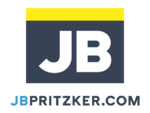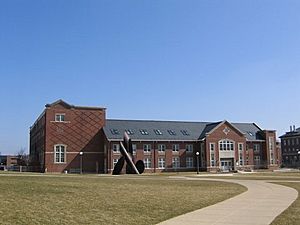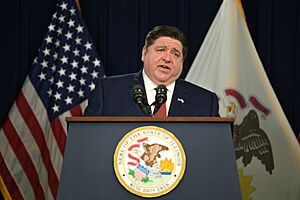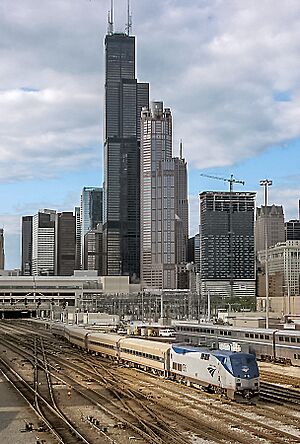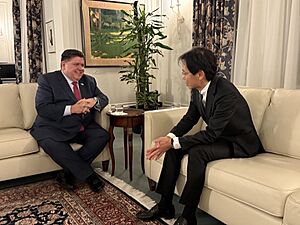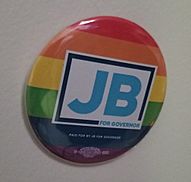JB Pritzker facts for kids
Quick facts for kids
JB Pritzker
|
|
|---|---|
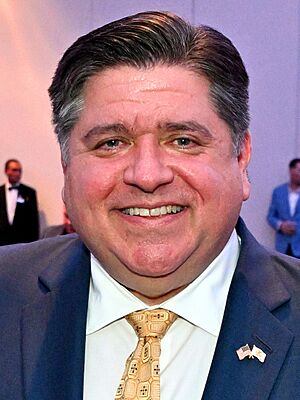
Pritzker in 2023
|
|
| 43rd Governor of Illinois | |
| Assumed office January 14, 2019 |
|
| Lieutenant | Juliana Stratton |
| Preceded by | Bruce Rauner |
| Chair of the Illinois Human Rights Commission | |
| In office April 1, 2003 – July 26, 2006 |
|
| Governor | Rod Blagojevich |
| Preceded by | Rose Jennings |
| Succeeded by | Abner Mikva |
| Personal details | |
| Born |
Jay Robert Pritzker
January 19, 1965 Palo Alto, California, U.S. |
| Political party | Democratic |
| Spouse |
Mary Kathryn Muenster
(m. 1993) |
| Relations | Pritzker family |
| Children | 2 |
| Parent | Donald Pritzker (father) |
| Relatives | Penny Pritzker (sister) Anthony Pritzker (brother) |
| Residence | Illinois Governor's Mansion |
| Education | Duke University (BA) Northwestern University (JD) |
| Occupation |
|
| Signature |  |
Jay Robert "JB" Pritzker (born January 19, 1965) is an American politician and businessman. Since 2019, he has been the 43rd governor of Illinois. He is part of the wealthy Pritzker family, known for owning the Hyatt hotel chain. Pritzker has also started several investment companies, including the Pritzker Group.
Born in Palo Alto, California, Pritzker went to Milton Academy, Duke University, and Northwestern University School of Law. He helped create Pritzker Group Private Capital and was involved in other businesses. This included 1871, a place that helps new digital companies grow. In 1998, he ran for a seat in the U.S. House of Representatives but did not win. From 2003 to 2006, he led the Illinois Human Rights Commission.
Before becoming governor, Pritzker was a strong supporter of the Democratic Party. He won the Democratic primary election for governor of Illinois in 2018. He then defeated the Republican governor, Bruce Rauner, in the main election on November 6, 2018. Pritzker became governor on January 14, 2019. As governor, he has focused on state money matters, education, healthcare, and making changes to the justice system. He also led the state's response to the COVID-19 pandemic. Pritzker was reelected in 2022.
Contents
- Early Life and Education
- Business Career
- Early Political Work
- Governor of Illinois (since 2019)
- Elections
- Cabinet
- State Budget and Taxes
- Child Welfare and Education
- Climate Change Efforts
- COVID-19 Pandemic Response
- Justice and Law Enforcement
- Gambling Expansion
- Gun Safety Laws
- Healthcare
- Immigration Support
- Infrastructure Projects
- Labor Rights
- LGBTQ+ Rights
- State Taxes
- Tobacco Laws
- Public Employee Pensions
- Voting Rights
- Welfare Programs
- Approval Rating
- Political Views
- Philanthropy
- Personal Life
- Images for kids
- See also
Early Life and Education
JB Pritzker was born in Palo Alto, California, on January 19, 1965. His parents were Donald Pritzker and Sue Pritzker. He is a member of the Pritzker family, a well-known family in business and charity. He was named "JB" after his uncles, Jay and Robert Pritzker. His grandfather, Abe Pritzker, was a business lawyer. The Pritzker family has often been listed among America's richest families. Donald Pritzker, his father, was the president of Hyatt Hotels. He passed away in 1972. His mother, Sue Pritzker, passed away in 1982. His older siblings are Anthony Pritzker and Penny Pritzker, who was once the U.S. Secretary of Commerce.
Pritzker has mentioned that some overseas trusts were set up by his grandfather. He says these trusts are only used for charity and do not benefit him personally.
Pritzker grew up in Atherton, California. He attended Milton Academy, a boarding school in Massachusetts. He then graduated from Duke University with a degree in political science. In 1993, he earned his law degree from Northwestern University School of Law. He is a lawyer and a member of the Illinois State Bar Association.
Business Career
Pritzker was the chairman of ChicagoNEXT, a group that advises the Chicago mayor on new ideas and technology. He also started 1871, a non-profit place that helps new digital companies get started. He helped create the Illinois Venture Capital Association. He also co-founded Chicago Ventures and helped fund other startup support groups.
With his brother Tony, Pritzker co-founded Pritzker Group Private Capital. This company buys and runs medium-sized businesses. Some of these include PECO Pallet and Clinical Innovations, which makes medical devices. In 2008, Pritzker received an award for his work in helping the economy and creating jobs.
Early Political Work
Working in Washington D.C.
In the 1980s, Pritzker worked for U.S. Representative Tom Lantos and U.S. Senators Terry Sanford and Alan J. Dixon. He focused on trade and transportation issues. After working in Washington D.C., Pritzker started an organization called Democratic Leadership for the 21st Century. This group aimed to get younger voters interested in the Democratic Party.
1998 Election Campaign
In 1998, Pritzker ran for a seat in the U.S. House of Representatives. He was one of several candidates in the Democratic primary election. The district he ran in covered parts of Chicago and nearby suburbs. Pritzker spent a lot of his own money on his campaign, including for TV ads. He finished third in the primary election.
State and National Roles
Governor Rod Blagojevich appointed Pritzker to lead the Illinois Human Rights Commission. He held this job from 2003 to 2006.
In the 2008 presidential election, Pritzker was a national co-chair for Hillary Clinton's campaign. He also attended the Democratic National Conventions in 2008 and 2016. He supported Barack Obama in the 2008 general election.
In 2017, a recording from 2008 was made public. It showed Pritzker and Governor Blagojevich talking about political appointments. Pritzker said he had not done anything wrong and was not accused of any wrongdoing by law enforcement. He later apologized for some of the comments he made during that conversation.
Governor of Illinois (since 2019)
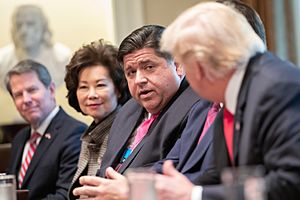
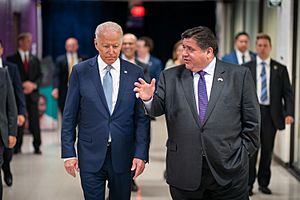
Elections
2018 Election
On April 6, 2017, Pritzker announced he would run for the Democratic nomination for governor of Illinois. Many groups and leaders supported him, including Illinois Secretary of State Jesse White.
On August 10, 2017, Pritzker announced that Juliana Stratton would be his running mate. She would become Lieutenant Governor if he won. Pritzker spent a lot of his own money on his campaign. On March 20, 2018, he won the Democratic primary election.
On November 6, 2018, Pritzker defeated the Republican governor, Bruce Rauner, in the general election. Pritzker won by a large margin. He spent about $171.5 million of his own money on his campaign.
Pritzker became Illinois's 43rd governor on January 14, 2019. He was reelected in 2022.
2022 Election
In June 2021, there were talks that Pritzker might not run again. However, on July 19, he confirmed on Twitter that he would seek reelection. Juliana Stratton was again his running mate. He won the Democratic primary on June 28, 2022. He then defeated Republican candidate Darren Bailey in the general election on November 8, 2022. Pritzker is the first Illinois governor to be elected to a second term since 2006.
In 2024, Pritzker was considered as a possible running mate for Kamala Harris in her presidential campaign. However, Minnesota Governor Tim Walz was chosen instead.
Cabinet
| The Pritzker Cabinet | ||
|---|---|---|
| Office | Name | Term |
| Governor | JB Pritzker | 2019–present |
| Lieutenant Governor | Juliana Stratton | 2019–present |
| Director of Revenue | David C. Harris | 2019–present |
| Secretary of Transportation | Omer Osman | 2019–present |
| Director of Children and Family Services |
Marc D. Smith | 2019–present |
| Director of Agriculture | John M. Sullivan | 2019–2020 |
| Jerry Costello | 2020–present | |
| Director of Veterans' Affairs | Col. Jaime Martinez | 2019 |
| Linda Chapa LaVia | 2019–2021 | |
| Terry Price | 2021–present | |
| Director of Natural Resources | Colleen Callahan | 2019–2023 |
| Natalie P. Finnie | 2023–present | |
| Director of Public Health | Ngozi Ezike | 2019–2022 |
| Amaal Tokers | 2022–present (acting) | |
| Secretary of Human Services | Grace B. Hou | 2019–present |
| Director of Labor | Michael Kleinik | 2019–2022 |
| Jane R. Flanagan | 2022–present | |
| Director of Healthcare and Family Services |
Theresa Eagleson | 2019–present |
| Director of Central Management Services |
Janel Forde | 2019–present |
| Fire Marshal of Illinois | James Rivera | circa 2023–present |
| Director of Commerce and Economic Opportunity |
Erin Guthrie | 2019–present |
State Budget and Taxes
On June 5, 2019, Pritzker signed a balanced budget for the 2019–20 fiscal year. This budget included more money for the U.S. Census. To pay for increased public spending, taxes were raised. A new law also added sales taxes on online purchases and a tax on insurance companies.
The budget also allowed a "tax amnesty" program. This let people who owed taxes from past years pay without extra fees. The governor's office hoped this would help pay down the state's unpaid bills.
Child Welfare and Education
The 2019–20 state budget included more money for education. This included grade schools, community colleges, and state universities. Funding for grade schools increased by nearly $379 million. Community colleges received $14 million more, and public universities got $53 million more. Grants for students with lower incomes also increased by $50 million. The Illinois Department of Children and Family Services received $80 million to hire new staff and improve services.
The Rebuild Illinois plan also set aside $3.2 billion for public colleges and universities over six years. This money helps with repairs and maintenance. For many years, Illinois colleges struggled financially. This led to many Illinois students choosing to go to colleges in other states.
Pritzker also created a task force to help students reduce their credit card debts after college. He also started a job training program for community colleges in 2020. In July 2019, he signed a bill that requires state universities to report tuition fees. This helps make college costs more clear.
Climate Change Efforts
Pritzker joined the United States Climate Alliance. This group aims to reduce greenhouse gas emissions. Illinois plans to reduce its emissions by over 26% by 2025.
COVID-19 Pandemic Response
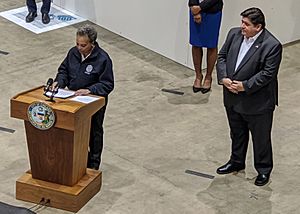
During the COVID-19 pandemic, Pritzker took steps to slow the spread of the virus in Illinois. On March 13, 2020, he announced that all public and private schools would close. On March 15, he ordered bars and restaurants to close, though takeout and delivery were still allowed.
On March 20, 2020, Pritzker issued a stay-at-home order. This meant all non-essential businesses had to close. Essential businesses like grocery stores and hospitals remained open. The state government worked with federal agencies and stores to set up testing sites. Some local leaders disagreed with the lockdown orders, but a judge ruled that the orders could stay in place.
On March 25, 2020, Pritzker extended the tax filing deadline. He also announced programs to help small businesses with over $90 million in aid. On May 1, 2020, Pritzker made it mandatory to wear masks statewide.
On May 5, 2020, Pritzker announced his reopening plan, "Restore Illinois." This plan had five phases and divided the state into four regions. Each region could reopen at its own pace. The plan allowed for gradual reopening of businesses and activities.
On December 4, 2020, Pritzker announced that Illinois would receive many doses of Pfizer's COVID-19 vaccine. On February 26, 2021, Pritzker and other leaders announced a new mass vaccination site at the United Center.
On July 29, 2021, Pritzker required face masks in all state buildings. On August 5, 2021, he required masks in schools, daycares, and long-term care facilities. He also required state employees in certain facilities to be vaccinated. On August 26, 2021, a statewide indoor mask mandate was put back in place. He also announced vaccine requirements for education and healthcare workers.
On February 28, 2022, Pritzker lifted most of Illinois's COVID-19 rules, including the mask mandate. On July 14, 2022, he lifted the COVID-19 vaccine requirement for college students.
Justice and Law Enforcement
Pritzker signed a bill to collect data on traffic stops. This helps address differences in how people are treated based on race. The 2019–20 budget also funded two new classes of Illinois State Police cadets.
In July 2019, Pritzker signed a law that increases penalties for drivers who cause injuries while texting. He also ended the practice of charging a fee for medical treatments for young people in juvenile correction facilities.
On February 22, 2021, Pritzker signed a justice reform bill. This bill made Illinois the first U.S. state to end cash bail. This change was put on hold for a while but went into effect in September 2023 after the Illinois Supreme Court approved it.
Gambling Expansion
To help pay for his 2019 spending plan, Pritzker expanded gambling. This allowed for more casinos and legalized sports betting. This expansion is expected to bring in an extra $350 million in revenue each year. It also allowed Chicago to have a casino, which the city wanted for economic growth.
Gun Safety Laws
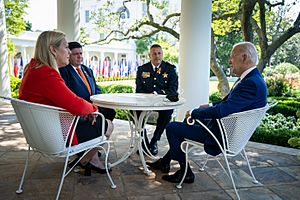
On January 17, 2019, Pritzker signed a bill requiring state certification for gun dealers. This law requires gun dealers to make their stores physically secure and keep detailed lists of items. It also requires employees to get yearly training. Supporters say this law helps prevent guns from getting into the wrong hands. Opponents argue it creates too much paperwork and does not improve safety.
On January 11, 2023, Pritzker signed a ban on certain types of assault weapons and high-capacity magazines. He said this law would make Illinois's gun laws a model for the nation. The new law took effect right away. Gun rights groups have challenged the law in court. The Illinois Supreme Court has ruled the law constitutional.
Healthcare
In 2019, Pritzker approved a tax on private insurance. This money goes to the state's Medicaid program, which helps people with lower incomes get healthcare.
Immigration Support
On January 24, 2019, Pritzker signed an order to expand access to Illinois welcome centers. These centers help immigrants and refugees with things like healthcare, education, jobs, and legal services.
On June 21, 2019, Pritzker signed a bill that bans private immigration detention centers in Illinois. Another bill stops state and local police from working with U.S. Immigration Customs and Enforcement (ICE) to deport undocumented immigrants. College students who are undocumented can also apply for state financial aid.
Infrastructure Projects
In June 2019, Pritzker signed the Rebuild Illinois capital bill. This plan is worth $45 billion and will be spent over six years. It is expected to create 540,000 jobs. This was the first major spending bill for infrastructure in Illinois in 10 years. The plan includes money for roads, schools, environmental protection, and expanding internet service in rural areas. It also funds healthcare facilities, libraries, and museums.
The money for this plan comes from several sources. The gas tax increased from 19 cents to 38 cents per gallon. Vehicle registration fees also increased. New casinos are expected to create jobs and bring in tax money for construction projects. Pritzker said that Illinois needed a major infrastructure plan because it had not had one for two decades.
In June 2019, Pritzker sent 200 Illinois National Guardsmen to help with flooding in central and southern Illinois. They helped with sandbagging and protecting levees. In August 2019, he asked for federal disaster help for 32 Illinois counties due to flooding.
Labor Rights
On February 19, 2019, Pritzker signed a law to raise the state's minimum wage to $15 an hour by 2025. Illinois was the first state in the Midwest to do this. The law includes tax help for small businesses to manage the higher costs.
On April 12, 2019, Pritzker signed the Collective Bargaining Freedom Act. This law protects the right of workers and their groups to negotiate for better conditions. On May 17, 2019, he signed a law to help workers exposed to harmful substances.
Pritzker also signed a bill that doubles the money given to families of police officers and firefighters killed while on duty. The amount increased from $10,000 to $20,000.
LGBTQ+ Rights
In June 2019, Pritzker signed an order requiring schools to be welcoming and supportive of transgender and non-binary students. He also asked the State Board of Education to lead efforts on LGBTQ+ rights.
State Taxes
Pritzker signed the "Fair Tax" law. This law proposed a change to the state's constitution to replace Illinois's flat income tax with a graduated tax. This means people with higher incomes would pay a higher percentage in taxes. Pritzker promised that income taxes would not increase for Illinoisans earning $250,000 a year or less. He said this change would bring in $3.4 billion in tax money.
Tobacco Laws
On April 7, 2019, Pritzker made Illinois the first state in the Midwest to raise the legal age for buying tobacco to 21. This is known as Tobacco 21. As part of his plan to fund state projects, Pritzker also raised the sales tax on cigarettes.
Public Employee Pensions
Pritzker did not agree to take on Chicago's pension debts. He believed this would hurt Illinois's credit rating. However, he did create a task force to find ways to deal with the growing pension debts of cities and towns.
Voting Rights
In June 2020, Pritzker signed a law to make Election Day a state holiday. This helps more people vote.
Welfare Programs
The 2019–20 budget included $230 million for a new Quincy Veterans Home and $21 million for the Chicago Veterans Home.
In July 2019, Pritzker signed a bill to create a food program for the elderly, disabled, and homeless. This program allows these individuals to get discounted meals from private businesses. This is part of the federal Supplemental Nutrition Assistance Program (SNAP).
Approval Rating
| Segment polled | Polling group | Date | Approve | Disapprove | Sample size | Margin-of-error | Polling method | Source |
|---|---|---|---|---|---|---|---|---|
| Adults | 1892 Polling/American Council on Trustees and Alumni | February 17–21, 2021 | 40.6% | 41.0% | 800 | ± 3.5% | telephone | |
| Adults | COVID-19 Consortium for Understanding the Public's Policy Preferences Across States | October 2–25, 2020 | 49% | – | – | ± 5% | online | |
| September 4–27, 2020 | 50% | – | – | ± 5% | ||||
| August 7–26, 2020 | 57% | – | – | ± 5% | ||||
| July 10–26, 2020 | 52% | – | – | ± 6% | ||||
| June 12–28, 2020 | 58% | – | – | ± 5% | ||||
| May 16–31, 2020 | 52% | – | – | ± 6% | ||||
| May 2–15, 2020 | 54% | – | – | ± 6% | ||||
| April 17–26, 2020 | 63% | – | – | ± 5% | ||||
| Registered voters | Morning Consult | October 1–December 31, 2019 | 43% | 41% | – | ± 1% | – | |
| Registered voters | Morning Consult | July 1–September 30, 2019 | 44% | 43% | 21,533 | ± 1% | – |
Political Views
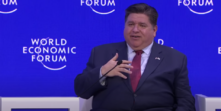
Environmental Issues
On January 23, 2019, Pritzker committed Illinois to the U.S. Climate Alliance. This group aims to reduce the state's greenhouse gas emissions. In 2023, Pritzker did not approve a law that would lift a ban on building new nuclear power plants in Illinois. He was concerned about nuclear waste.
Gun Safety
Pritzker supports bans on certain types of firearms and large magazines. He also supports strict rules for registering firearms.
Immigration
Pritzker supports Syrian refugees. He has also supported more funding for immigrant and refugee services. He wants to increase healthcare options for undocumented immigrants. He also supports providing financial aid for undocumented students.
In January 2025, Pritzker said he supports deporting undocumented people who have committed crimes. However, he criticized targeting "law-abiding residents" who are part of communities.
LGBTQ+ Rights
Pritzker has long supported LGBTQ+ rights. He has taken part in the Chicago Gay Pride Parade. During his 2018 campaign, he said his government would address hate crimes against LGBTQ+ people. He also promised to expand LGBTQ+ access to healthcare.
Minimum Wage
As a candidate for governor, Pritzker promised to raise the minimum wage in Illinois to $15 an hour. He put a plan in place to do this. The minimum wage increased gradually each year and reached $15 an hour on January 1, 2025.
Internet Rules
Pritzker supports net neutrality. He has said that as governor, he would make sure all internet traffic is treated equally. This helps people use the internet for business, education, and free expression.
Alliance of Governors
In November 2024, Pritzker and other U.S. state governors formed an alliance. This group aims to protect their states' interests against possible changes in the federal government.
Philanthropy
Through the Pritzker Family Foundation, Pritzker has funded research and programs for children in poverty. He supported the creation of a group at the University of Chicago that focuses on early childhood development. He also helped start the First Five Years Fund, which supports early care and learning programs for young children. In 2013, Pritzker worked with Goldman Sachs to fund a special project for early childhood education.
Pritzker was the chairman of the Illinois Holocaust Museum and Education Center. He helped raise money and plan the building of this museum. It teaches about the Holocaust and other genocides. He also funded Cambodia Tribunal Monitor, an online source for news about the court that brought justice to those responsible for the acts of genocide during the Pol Pot era.
In 2007, Pritzker and his wife donated $5 million to the University of South Dakota. This money helped build a university center named after his wife's parents. In 2011, Milton Academy named its science center after Pritzker because of his large gift. Pritzker is also involved with Northwestern University.
On October 22, 2015, Northwestern University School of Law announced a $100 million gift from Pritzker and his wife. The school was then renamed the Northwestern Pritzker School of Law.
Personal Life
In 1993, Pritzker married Mary Kathryn "M. K." Muenster. They met in Washington, D.C. They live in Chicago and also at the Illinois Governor's Mansion in Springfield with their two children.
During the 2018 campaign, there was a report about a property tax issue. Pritzker had bought a mansion next to his home. He removed its toilets, which made the house seem uninhabitable. This allowed him to get a large reduction in his property taxes. He later paid back the amount of the tax reduction. Federal authorities looked into the matter, but no wrongdoing was found.
Images for kids
See also
 In Spanish: J. B. Pritzker para niños
In Spanish: J. B. Pritzker para niños
 | Delilah Pierce |
 | Gordon Parks |
 | Augusta Savage |
 | Charles Ethan Porter |


